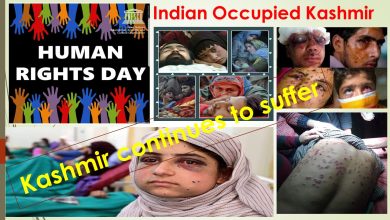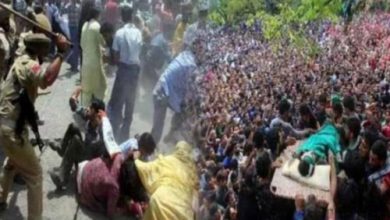 India is often celebrated as one of the largest democracies in the world, a title it has proudly projected on the global stage. This narrative, supported by a facade of rapid technological advancement and emerging as a progressive force, has been largely accepted. However, beneath this carefully crafted image lies a more troubling reality that is often overlooked. The true picture, far from the polished portrayal, reveals deeper challenges that remain hidden from the spotlight.
India is often celebrated as one of the largest democracies in the world, a title it has proudly projected on the global stage. This narrative, supported by a facade of rapid technological advancement and emerging as a progressive force, has been largely accepted. However, beneath this carefully crafted image lies a more troubling reality that is often overlooked. The true picture, far from the polished portrayal, reveals deeper challenges that remain hidden from the spotlight.
The beacon of freedom and progress that India projects is, in reality, a facade, obscuring the painful truth of its violent history. For nearly a century, the country has perpetrated grave injustices against innocent Kashmiris and minorities, while presenting itself as a symbol of democracy and unity. Beneath this illusion lies a rising tide of authoritarianism and Hindutva nationalism, which increasingly threatens the values of justice, equality, and secularism. This stark contrast between India’s self-image and its actions raises critical questions about the true state of its democracy.
The forgotten victim
For decades, Kashmir, a land once revered for its natural beauty, has silently endured the ravages of conflict and oppression. The people of Jammu and Kashmir face a new hardship with each dawn, yearning for the freedom that was taken from them following India’s military takeover of their region.
The abrogation of Article 370 in August 2019, which revoked Indian illegally occupied Jammu and Kashmir’s special status, was a watershed moment in this long-standing struggle. The Indian government imposed a near-total communication blackout, detained thousands of political leaders, and deployed tens of thousands of additional troops in the dark of the night. These heavy-handed actions were justified as “development” and “integration” on the international stage, but the true cost of such measures was borne by the people of Kashmir, who found themselves trapped in a living nightmare, their rights and voices silenced.
Human rights organizations have consistently documented the devastating use of pellet guns, leaving many children and young people in IIOJK permanently blinded by this brutality. Stories of forced disappearances, extrajudicial killings, and mass graves have become all too familiar. The Armed Forces Special Powers Act (AFSPA) empowers Indian troops with unchecked authority, enabling them to carry out crimes against innocents without fear of accountability. Despite the mounting evidence of these atrocities, the global community remains largely silent, still inclined to favor India, swayed by its economic influence and diplomatic appeal.
Silenced resistance
Any attempt to question the brutality faced by the Kashmiris is met with instant retaliation, as if an attempt to nip the dissent in the bud. Even those who stood up—journalists and activists alike—were put through the harshest circumstances ranging from harassment and detention to violence and even death. Media outlets have started losing credibility under state pressure, with some even resorting to censoring the truth from reaching public forums.
The arrest of prominent journalists and activists such as Fahad Shah, Khurram Parvaiz and the targeting of independent media outlets highlight the shrinking space for free expression in the region. By suppressing voices in Kashmir, India is not only undermining the democratic values it claims to uphold but also perpetuating a cycle of fear, repression and injustice.
Minorities under siege
The relentless crackdown on occupied Jammu and Kashmir is merely one aspect of a larger, deeply ingrained pattern of oppression that India has institutionalized. The rise of Hindu extremist groups has left little room for tolerance, leaving the country’s minorities increasingly vulnerable. Muslims, Christians, and Dalits are all victims of a disturbing surge in violence and persecution. Lynchings in the name of cow protection, attacks on churches, and the ongoing marginalization of Dalits—once considered “untouchables”—serve as grim reminders of the growing intolerance that permeates India.
Over 200 million Muslims in India live in a state of constant fear, haunted by the threat of harassment and oppression. The introduction of the Citizenship Amendment Act (CAA) in 2019, along with the proposed National Register of Citizens (NRC), puts millions of Muslims at risk of being rendered stateless. These policies ignited widespread protests, which were met with police brutality—just as many had feared. In the midst of these injustices, Christians see their churches vandalized and pastors attacked under false accusations of forced conversions.
Meanwhile, Dalits continue to endure systemic discrimination rooted in centuries of caste-based oppression. Despite constitutional protections, caste-based disparities persist, denying Dalits access to basic resources and opportunities. This intersection of caste and religious discrimination starkly exposes the gap between India’s self-proclaimed image of progress, development, and equality, and the harsh realities faced by its marginalized communities.
Global silence
India’s rise as a global power and its burgeoning economic influence have largely shielded it from being held accountable for the severe human rights violations taking place within India and occupied Jammu and Kashmir. World leaders, eager to strengthen trade and defense relations, frequently overlook the country’s dismal record on human rights. Even international bodies like the United Nations, tasked with safeguarding human rights, have struggled to hold India accountable, often constrained by geopolitical considerations and strategic interests.
Could there be a way forward?
The dissonance between India’s projected image as a thriving democracy and its increasing authoritarianism is stark. For true justice, equality, and democracy to flourish, the first barrier that must be dismantled is the entrenched classism based on religion, caste, and region. The global community also carries a moral responsibility to challenge India’s illegal occupation of Jammu and Kashmir, its settler colonialism in the region, and its ongoing repression of minorities. Diplomatic and economic relations cannot, and must not, come at the cost of human rights and dignity. The world must act, not just in words, but through meaningful actions that hold India accountable to the universal principles it claims to uphold.
As for civil society within India, it is crucial that they continue to stand up for justice and truth, resisting the erosion of democratic values. Those who dare to challenge injustice become the last beacon of hope for those trapped in oppression. Though their voices are often suppressed, they remain a powerful testament to the resilience of individuals who refuse to accept the status quo.
Conclusion
The stark contrast between India’s global image and its domestic reality is undeniable. While the state continues to tout itself as a thriving democracy, its actions in Indian illegally occupied Jammu and Kashmir and against minorities across the country reflect the rise of authoritarianism and fascism. The world must look beyond the dazzling façade and confront the uncomfortable truths lurking in the shadows.
True progress cannot be built on a foundation of oppression, and genuine democracy cannot coexist with systemic injustice and authoritarianism. By addressing these glaring contradictions, India has the opportunity to align its actions with its democratic ideals, paving the way for a future rooted in equality, justice, and dignity for all its people.
 Ms. Shazia Ashraf currently serves as a research associate at Kashmir Institute of International Relations. She can be reached at shaziahashrafkhawaja@gmail.com.
Ms. Shazia Ashraf currently serves as a research associate at Kashmir Institute of International Relations. She can be reached at shaziahashrafkhawaja@gmail.com.








